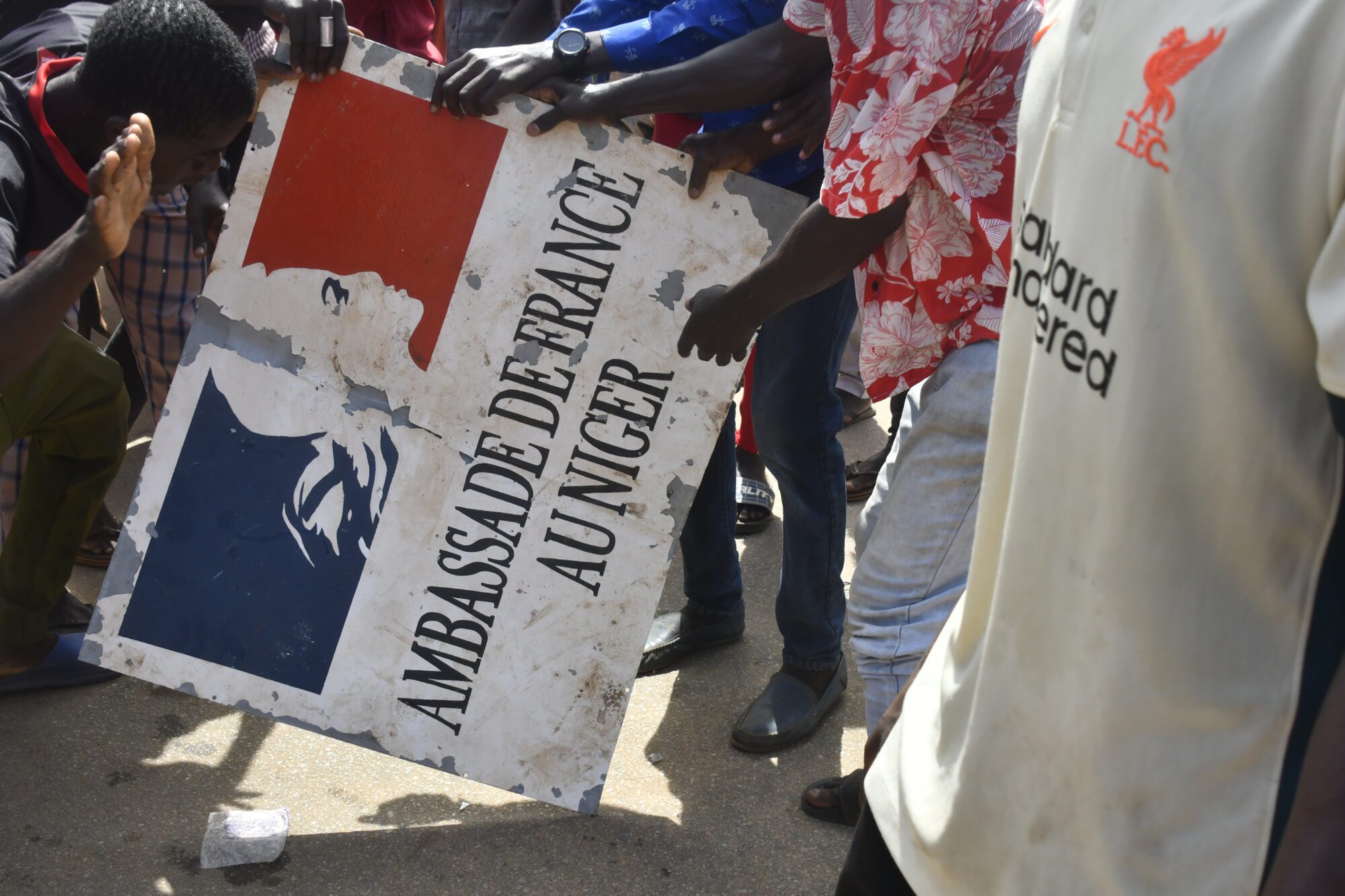
Protesters hold a sign taken from the French Embassy in Niamey during a demonstration that followed a rally in support of Niger’s junta in Niamey on July 30th, 2023.
Photo by AFP
Niger recently joined Mali, Burkina Faso, and Guinea in a slide away from the West as the country underwent a coup last week. With Prigozhin’s Wagner forces waiting to offer assistance for the new government, Niger is feeling regional and EU pressure to reverse course.
ECOWAS, the acronym for ‘Economic Community of West African States’, West Africa’s regional bloc, issued an ultimatum July 30th to those who led last Wednesday’s military coup in Niger: If ousted President Mohammed Bazoum is not reinstated within the week, ECOWAS will take “all measures necessary to restore constitutional order,” which may include “the use of force,” its final communiqué stated.
Niger, which has a population of 25 million and is one of the poorest countries in the world, is currently being led by the self-appointed General Abdourahmane Tchiani. He was the former head of the presidential guard.
The bloc also announced sanctions, both for the country and for those behind the coup. Niger’s assets with the central banks of fellow ECOWAS member states will be frozen, while all commercial and financial ties will be severed.
ECOWAS held its emergency summit in Nigeria—the organization’s current chair—where Nigerian President Bola Tinubu ordered the defense chiefs of all 15 member states to meet as soon as possible to discuss their options.
It is customary for ECOWAS to have a military force on standby in case member democracies, like Niger, encounter challenges to the proper functioning of that political system. The last time it intervened was in 2017, when President Yahya Jammeh of The Gambia, having lost the election, refused to commit to a peaceful transfer of power. At the request of Adama Barrow, the winner of that year’s election, ECOWAS forces entered The Gambia, putting an end to the country’s constitutional crisis.
Since 2020, successful coups have taken place in ECOWAS member states Mali, Burkina Faso, and Guinea. Then, ECOWAS reacted by suspending their membership. Now, ECOWAS’s intervention forces have been strengthened to deal with threats in the Sahel by jihadist groups linked to al-Qaeda and Islamic State, and with coups.
The change may be too late. Led by military juntas, these nations subsequently partnered up, creating a smaller bloc of their own. Niger is in real danger of being the latest addition to that group, which would be a crushing blow to the West’s interest in the region. The EU and France (of which Niger was a former colony) have announced their own countermeasures, suspending cooperation on security and financial aid to the country.
The U.S., which has used Niger as a base to fight an Islamist insurgency in West and Central Africa’s wider Sahel region, has not yet taken that step. But according to U.S. Secretary of State Antony Blinken, Washington’s relationship with the country is “in jeopardy.”
The Bazoum-led Niger was considered the West’s last ally in the Sahel region, where China and Russia have been making gains.
Mali and Burkina Faso, having already fallen prey to coups, have for instance increasingly turned to Russia—in particular, its mercenary force, Wagner PMC. A future Wagner presence in Niger has then become a real possibility. Following news of the coup, Wagner boss Yevgeny Prigozhin already offered his services, while praising Niger for having gotten rid of the “colonizers.”
In addition, France has economic interests in Niger, which is rich in uranium. Some 10% of the uranium used by French nuclear power plants is sourced from there.
Events on Sunday, July 30th, indicated how goodwill towards France is dwindling precipitously. At the French Embassy in Niger’s capital of Niamey, French flags were burned while anti-French slogans were chanted by supporters of the coup. As a further illustration of shifting allegiances, supporters waved Russian flags and chanted slogans in favor of the country.
Some among the crowd threw stones at the embassy and tried to climb over the walls.
French President Macron came out strongly against what had occurred, warning he would “not tolerate any attack against France and its interests,” while specifying that France would respond to attacks against its diplomats, armed forces, or businesses.
